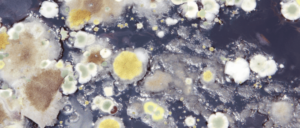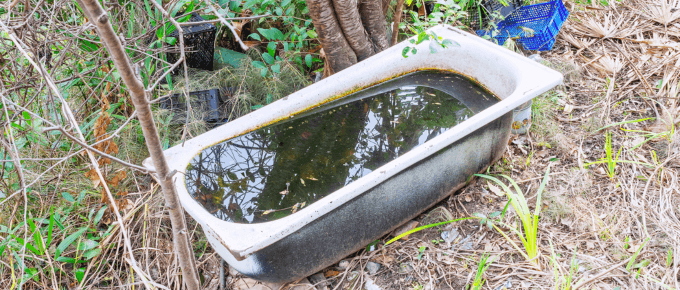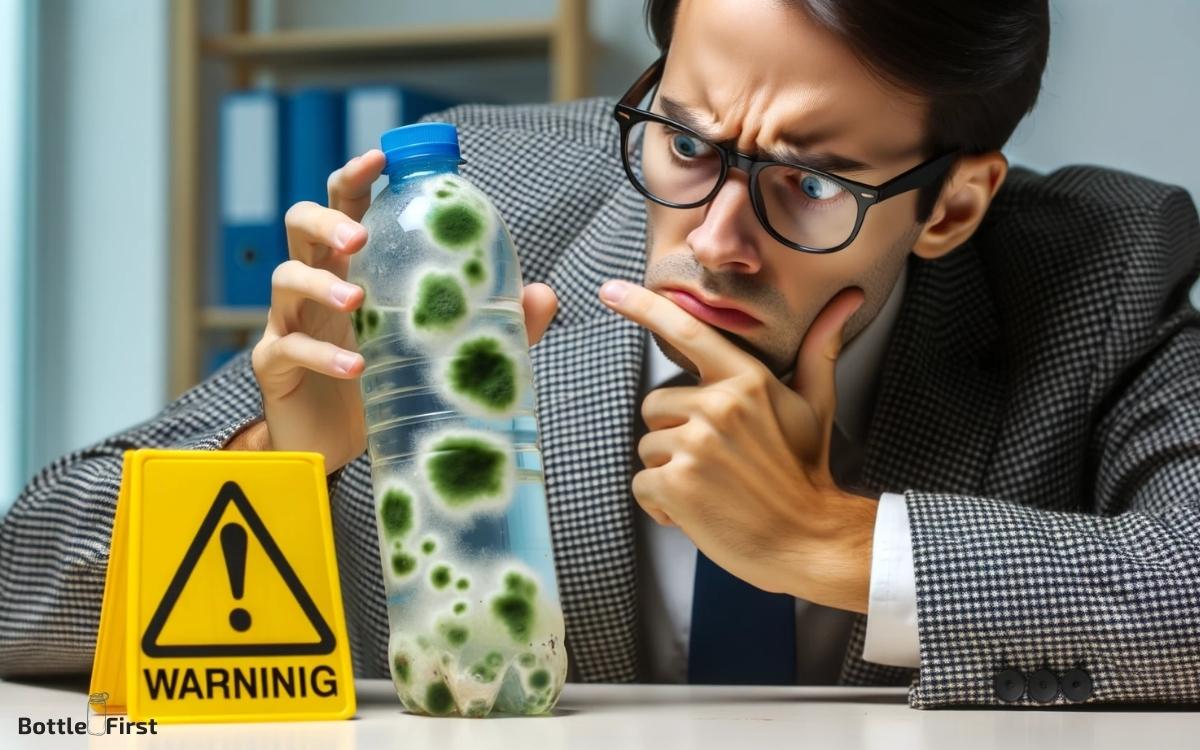Moldy water isn’t the spa day you wanted, but it’s not necessarily fatal. Knowing what you’re doing will help you handle this weird situation with peace of mind, focus, and maybe even a bit of humor. Instead of being sad, let’s use this as a mold-tastic (in a good way) chance to learn.
AH, water. Mold can grow in nature’s best quencher, lifeblood. Everyone has dreamed of drinking from a chilly water bottle with a fuzzy surprise. Ladies and gentlemen, don’t worry—this guide will teach you what to do if you drink moldy water with grace and knowledge.
Getting rid of doubts: the first steps after being exposed to moldy water
Mold contact can be bad for your health, but taking action right away can lessen the damage.
What you should do is:
- Stop drinking: Obviously, put down that drink right away. Clear your mouth out with clean water and spit out any extra water.
- Look at the situation: Did you take a small sip or a big gulp? Think about the mold type (if you can figure it out) and the amount of water it used. This will help figure out how dangerous it might be.
- Get in touch with a medical professional: Visit a doctor immediately if you had nausea, vomiting, or trouble breathing.
- Monitor for reactions: Over the next few days, watch for flu-like symptoms, digestive difficulties, and allergic responses.
What Causes Mold: The Science Behind the Spores
Molds are everywhere and flourish in dampness. When they are in water, they release tiny spores that can be dangerous if you breathe them in or eat them.
Some common molds in water sources are toxic:
- Gastrointestinal issues: Most common are nausea, vomiting, diarrhea, and stomach cramps.
- Allergic reactions: Mold spores can cause sneezing, coughing, irritated eyes, and wheezing.
- Respiratory problems: Mold pollution can cause breathing problems, swollen lungs, and even lung infections in the worst cases.

bottlefirst.com
Prevention is Key: Keeping Your Water Mold-Free
To keep your valuable sources of water clean, follow these tips:
- Clean and dry often: Use soap and water to clean reusable bottles and containers well, and let them dry fully in the air. Mold-killing power can also be found in dishwashers.
- Avoid leaving water stagnant: Especially in warm places, don’t leave water in bottles for long amounts of time. Every day, empty and fill up.
- Clean your water: Water filters can get rid of some mold spores, which is an extra safety measure.
- Be mindful with natural sources. If you want to drink water from streams or other outdoor sources, you might want to boil it first to get rid of mold and other harmful substances.
Beyond the Blog: Resources and Further Exploration
Here are some useful resources to help you learn more:
- Centers for Disease Control and Prevention (CDC): Provides information on different kinds of mold, their health effects, and how to avoid getting them.
- The Environmental Protection Agency (EPA) provides advice on how to safely remove mold and address any issues it may have caused.
- The American Lung Association talks about mold allergies and breathing problems that can happen when you’re exposed to mold.
Frequently Asked Questions (FAQ’s)
Is Moldy Water Harmful?
Mold isn’t always bad, but some types found in water can make people allergic, give them breathing problems, or even give them illnesses. How bad the effects are varies on the type and amount of mold you ate, as well as your health.
What Kills Mold in Drinking Water?
If you boil water for at least one minute, most mold spores will die. That being said, this method doesn’t get rid of the mold’s poisons. If you think mold is in your drinking water, you should get it tested by a professional service and think about long-term options like filtration systems.
How Do You Detox Your Body from Mold?
There is no scientific proof that certain “detox” ways for mold exposure work. But living a healthy life and eating a balanced diet full of fruits, veggies, and whole grains can help your body’s natural detoxification processes. If you’re worried about being exposed to mold, you should talk to a doctor or nurse.

How Long Does Mold Poisoning Last?
Mold “poisoning” is a broad term, and the length of symptoms depends on the type and amount of exposure, as well as how sensitive the person is. With the right care, short-term symptoms like allergic reactions generally go away in a few days. But some people may have long-term health problems after being exposed to mold for a long time.
Is White Water Mold Toxic?
Stachybotrys chartarum, which is sometimes just called “black mold,” is often linked to being harmful. But some types of white mold can also make dangerous mycotoxins. If you think mold is growing in your water, no matter what color it is, it’s best to be safe and get professional help.
What Kills 100% of Mold?
There’s no quick fix that will always kill all mold, which is a shame. For each type of mold and each place, a different method works best. Bleach can work on hard surfaces, but it shouldn’t be used on porous materials like rugs or wood. Professionals who clean up mold have access to special tools and methods for getting rid of mold completely.
Does Water Mold Go Away?
Remember that mold grows best in damp places, so fixing problems with wetness can sometimes get rid of mold. To get rid of it completely, though, you usually need to clean the impacted areas with the right disinfectants and make sure there is enough air flow to stop it from growing again.
How Do You Know If Water Has Mold?
Mold pollution can be seen as mold growth, a musty smell, or changes in the taste or color of water. If you think there might be mold in your water, you should have it checked by a professional who can correctly identify it and give you advice on what to do next.
Why Does Water Get Moldy?
Mold spores are everywhere in the environment and can easily get into water sources, especially if there is a lot of water or problems with wetness. Mold can grow in water systems when there are leaks, not enough air flow, and high humidity.
Why Does My Water Mold So Fast?
A lot of things can make mold grow quickly in water, like warm temperatures, organic matter in the water, and not enough water flow. If your water grows mold quickly, you need to find and fix the root cause to keep the problem from happening again.
What Foods Fight Mold in the Body?
A healthy diet full of vitamins and probiotics can help your immune system work better overall, but no one food can “fight” mold in the body. Good sources of these elements include fruits, veggies, yogurt, and fermented foods.
What Kills Mold in the Body Naturally?
There are natural ways for your body to protect itself from mold. Your immune system can fight off any health issues that mold might cause by managing your stress, getting enough sleep, and exercising regularly. However, if you have signs that are bothersome, you need to see a doctor right away.
How Do You Remove Mold from Yourself?
If you’ve been around mold, take off any clothes that are dirty and wash your face well with soap and water. If mold spores get into your eyes, wash them out for a while with clean water. See a doctor if you have any signs that won’t go away after being exposed.
Will Eating Mold Make You Sick?
What happens when you eat mold depends on what kind and how much you eat. Some kinds of mold can make you feel like you have food poisoning, while others might not do anything at all. If you eat moldy food by mistake, you should watch out for any possible symptoms and see a doctor if you have any concerns.
With information and a proactive strategy, you may overcome this unwanted encounter and return to your H2O oasis.
You may reduce harm, manage symptoms, and prevent moldy accidents with this guidance. Now, action is powerful. Keep every drink clean with our free “Mold-Proof Hydration Handbook” of cleaning methods, expert advice, and checklists. It’s your ticket to worry-free hydration and celebrations with every sip.
Remember, knowledge is power and preparedness is protection beyond the handbook. Subscribe to our blog more mold-busting techniques, share this article with your hydration team, and spread the word! Let’s end “moldy water woes”


Leave a Reply